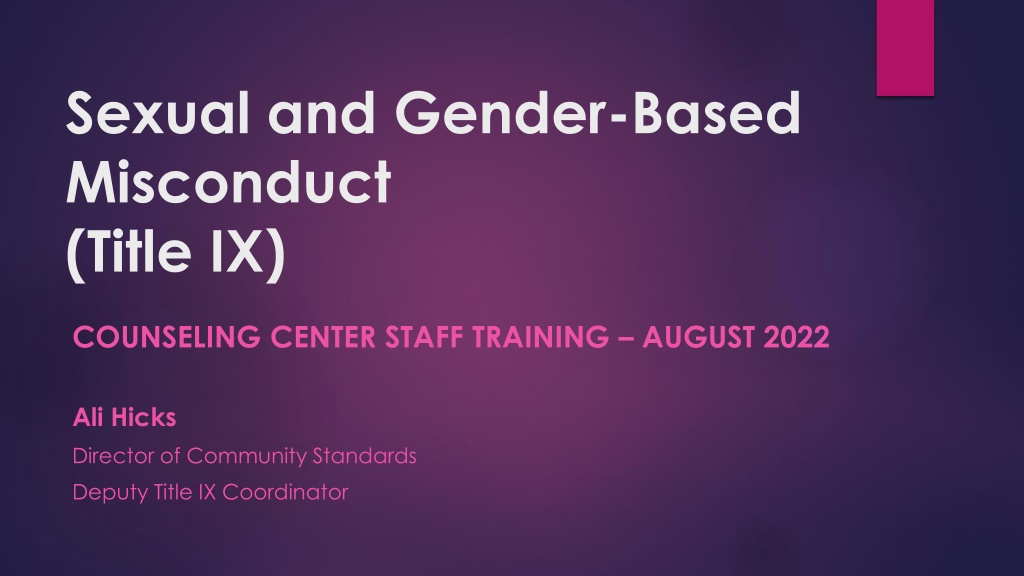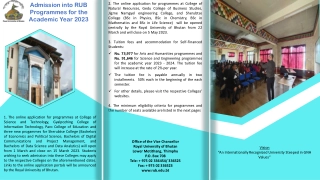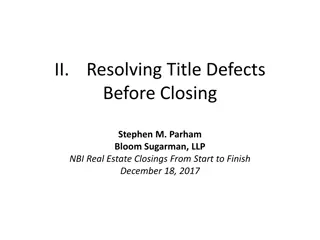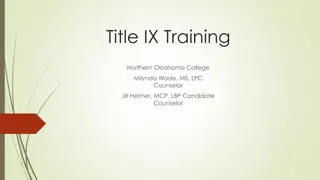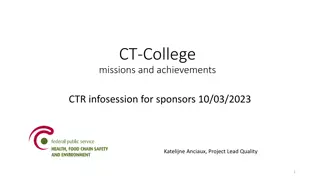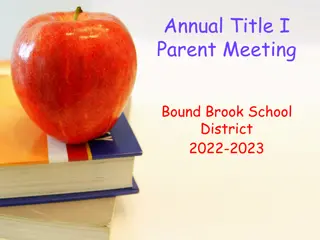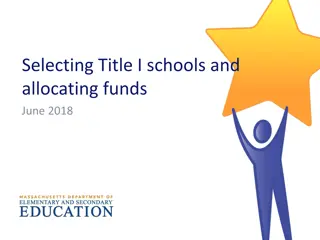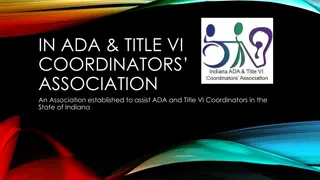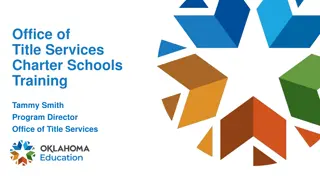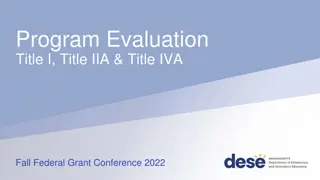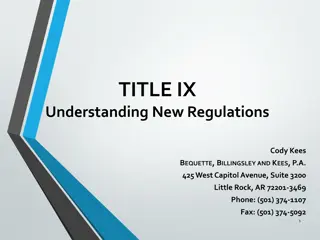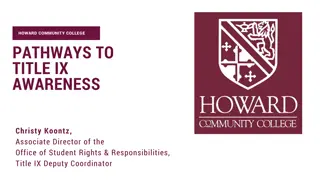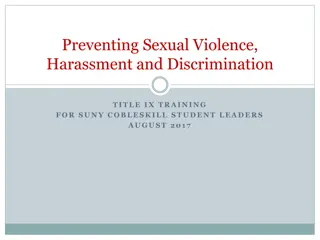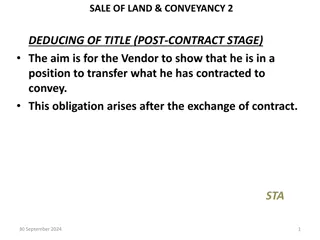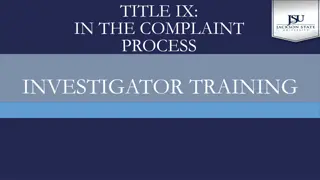Stonehill College Title IX Training 2022
Stonehill College conducts training on Sexual and Gender-Based Misconduct (Title IX) for counseling center staff, emphasizing the importance of addressing and preventing such conduct. The training covers policies, terminology, jurisdiction, and prohibited conduct related to sexual and interpersonal violence. The aim is to create a safe and supportive environment for all members of the college community.
Download Presentation

Please find below an Image/Link to download the presentation.
The content on the website is provided AS IS for your information and personal use only. It may not be sold, licensed, or shared on other websites without obtaining consent from the author. Download presentation by click this link. If you encounter any issues during the download, it is possible that the publisher has removed the file from their server.
E N D
Presentation Transcript
Sexual and Gender-Based Misconduct (Title IX) COUNSELING CENTER STAFF TRAINING AUGUST 2022 Ali Hicks Director of Community Standards Deputy Title IX Coordinator
Title IX Title IX of the Education Amendments of 1972 (to the Civil Rights Act of 1964) Federal civil rights law that states: No person in the United States shall, on the basis of sex, be excluded from participation in, be denied the benefits of, or be subjected to discrimination under any education program or activity receiving Federal financial assistance. Dictates how colleges manage reports of sexual misconduct Regulations updated in August 2020 More changes coming!
Stonehill College Policy Sexual and Gender-Based Misconduct and Interpersonal Violence Policy
Terminology Complainant the individual who is alleged to have been the victim of another person s misconduct. Victim and Reporting Party may be used interchangeably. Respondent the individual who has been reported to be the perpetrator of misconduct
Jurisdiction Pertains to acts of sexual/gender-based misconduct or interpersonal violence committed by any student, employee, or third party against another student, an employee, or a third party in the United States when the alleged harassment involves conduct that occurred within the College s own program or activity or in a building owned or controlled by the College
Prohibited Conduct Dating Violence Committed by a person who is or has been in a social relationship of a romantic or intimate nature with the victim. Includes, but is not limited to, sexual, or physical abuse or the threat of such abuse.
Prohibited Conduct Domestic Violence A felony or misdemeanor crime of violence committed o by a current or former spouse or intimate partner of the victim; o by a person with whom the victim shares a child in common; o by a person who is cohabitating with, or has cohabitated with, the victim as a spouse or intimate partner
Prohibited Conduct Gender-Based Harassment Acts of verbal, nonverbal, or physical aggression; intimidation; or hostility based on gender or gender- stereotyping Can occur if individuals are harassed either for exhibiting what is perceived as a stereotypical characteristic of their sex or for failing to conform to stereotypical notions of gender expression In order to constitute harassment, the conduct must be such that it has the purpose or effect of unreasonably interfering with an individual s academic performance or creating an intimidating, hostile, demeaning, or offensive living or learning environment.
Prohibited Conduct Sexual Harassment An employee conditioning an educational or employment benefit or service upon a person s participation in unwelcome sexual conduct (often called quid pro quo harassment) Unwelcome conduct on the basis of sex that is so severe, pervasive, and objectively offensive that it effectively denies a person equal access to the College s education or employment program or activity
Prohibited Conduct Sexual Harassment Unwelcome sexual advances, whether or not they involve physical touching Lewd or sexually suggestive comments, including jokes, innuendos, or gestures Stripping and/or the solicitation of stripping Displaying sexually suggestive objects, pictures, magazines, or cartoons Commenting about or inappropriately touching an individual s body, Inquiries or discussion about an individual s sexual experiences or activities and other written or oral references to sexual conduct
Prohibited Conduct Sexual Misconduct Non-Consensual Sexual Intercourse, which is the penetration, no matter how slight, of the vagina or anus with any body part or object, or oral penetration by a sex organ of another person, without the consent of the victim. Non-Consensual Sexual Contact, which includes but is not limited to, the touching of the private parts of another person, without the consent of the victim, including instances where the victim is incapable of giving consent because of their age or because of their temporary or permanent mental incapacity.
Prohibited Conduct Sexual Exploitation Taking advantage of another individual without that individual s consent for their own advantage or benefit, or for the benefit or advantage of anyone other than the individual being exploited. Examples include: o Sexual exhibitionism o Non-consensual video, photographing, or audio-recording of sexual activity and/or distribution or threat of distribution of these materials without consent o Going beyond the boundaries of consent (e.g., allowing people to watch consensual sex without knowledge of the participants) o Peeping o Knowingly transmitting a Sexually Transmitted Infection (STI) to another individual
Prohibited Conduct Stalking Engaging in a course of conduct directed at a specific person that would cause a reasonable person to fear for the person s safety or the safety of others or suffer substantial emotional distress. course of conduct means two or more acts substantial emotional distress means significant mental suffering or anguish that may, but does not necessarily, require medical or other professional treatment or counseling.
Prohibited Conduct Retaliation Any threat of retaliation against a complainant, respondent, or witness, or other attempts to prevent the reporting of an incident of sexual/gender-based misconduct or interpersonal violence or cooperation with the investigation is itself prohibited and will result in a subsequent and separate investigation. Includes, but is not limited to, intimidation, threats, coercion, and any adverse action.
Title IX Team Investigator David Bamford Donahue Hall 120 Title IX Coordinator Lily Krentzman Merkert Tracy 145 Assistant Athletic Director, Compliance Kit Giffen Sports Complex 219E Investigator Natasha Anderson Merkert Tracy 152
Reporting Options for Victims Report to the College Report to Easton Police Department Report to both the College and the Easton Police Department Make an Anonymous Report Take No Action Amnesty
Reporting (titles in draft policy) Campus Security Authorities (CSAs) must report Individuals designated by the College to be mandated reporters of crimes, include SGBM violations Vice President for Student Affairs, the Dean of Students, all Residence Life staff, the Director of Student Engagement, the Director of Athletics, the Director of Community Standards, Campus Police, Treasurer, Controller Officials with Authority (OWAs) must report to TIX Coordinator Employees explicitly vested with the responsibility to implement corrective measures for sexual harassment on behalf of Stonehill The Title IX Coordinator, Deputy Title IX Coordinator, Vice President for Student Affairs, Associate Vice President for Student Affairs/Dean of Students, any Campus Police Officer, the General Counsel, and any Associate or Assistant General Counsel All other staff MAY report
Reporting Confidential Resources Licensed counselors (Counseling Services) Licensed medical professionals (Health Services) Certified athletic trainers Pastoral counselors who are ordained clergy Designated Confidential Resource Providers (Prof. Marilena Hall and Steve Fitzgerald)
Response to Reports Goal: To offer support and resources to affected students Steps: Initial intake by Title IX Coordinator/Deputy Threat assessment Supportive Measures Discussions of options for next steps victim s choice
Next Steps Formal Complaint must be filed by the Complainant in order for the College to investigate/take further action In rare circumstance, the Title IX Coordinator can file a Formal Complaint Once Formal Complaint is filed, the Grievance Process can begin or an Informal Resolution process can occur
Grievance Process The Respondent is notified of allegations Parties are notified of Informal Resolution option Formal investigation commences (all parties, witnesses interviewed, evidence gathered) Live hearing takes place. Cross-examination is allowed, though witnesses are not compelled to submit. Parties can have an advisor of their choice present (can be an attorney), or one is assigned
Grievance Process Hearing Officer submits to Dean Piskadlo a written recommended determination. Dean Piskadlo then issues the decision. Appeal process
Informal Resolution Can occur at any time during this process Requires consent from both parties Formal grievance process can begin/resume if informal process is not viable Once finalized and agreed, case is closed.
If a victim discloses Remind of the various resources you know about on campus Refer them to the Title IX website Encourage them to report and get the support they need Remind them that any next steps are up to them
On-Campus Resources 24/7 crisis line Counseling Services Title IX Coordinator (or Ali) Health Services Campus Ministry Residence Life Intercultural Affairs
Off-Campus Resources A New Day, Rape Crisis Center in Brockton Signature Healthcare Brockton Hospital participates in the Sexual Assault Nurse Examiner Program, also called SANE Easton Police Department Brockton Police Department
THANK YOU! Ali Hicks ahicks@stonehill.edu Duffy 142 - Community Standards
